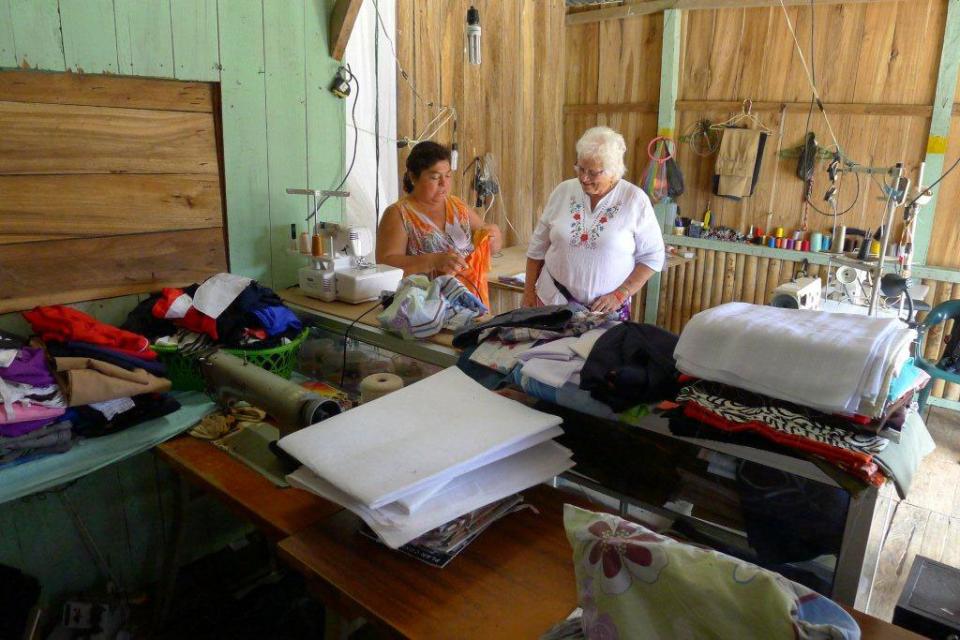Global grant partnership turns good idea into bigger, sustainable project

A microloan recipient shows off one of the items she made in her sewing shop.
Photo Credit: Photo courtesy of Rotary Club of Marin Evening, California, USA
Photo Credit: Photo courtesy of Rotary Club of Marin Evening, California, USA
In the Esmeraldas Province of Ecuador, Rotary members have teamed up with a microfinance organization to provide small loans to poor women, teaching them to sew and bake so they can start or expand businesses.
The Rotary Club of Marin Evening, in California, USA, reached out to 64 Rotary clubs in seven districts including Ecuador's, to raise money, find support from partners, and mobilize local community members for a global grant project.
Keith Axtell, a member of the Marin Evening club, says the effort began in 2005-06, when his wife, Holly, was district governor and was looking for an international project the district could lead and that clubs could join without doing a lot of paperwork themselves. The Axtells took a team of district leaders to explore projects in Ecuador, including one conducted by the Rotary Club of Guayaquil. The club was working with a microcredit organization to turn funds it had raised into seed money for small loans.
"We took a group of people from different clubs in our district to see [this project] and they loved it," Axtell says. "We started out with an initial Matching Grant, and the response was overwhelming. People kept saying they wanted to contribute to the next one, so we just kept going."
Eventually, the Guayaquil microfinance operation had enough capital to sustain itself, so the Axtells' club sought a new partner. It found the Rotary Club of Quito Occidente, which wanted to get involved in microcredit, and the clubs collaborated on a global grant application.
Through a Web search, Axtell found the microfinance organization FUDECE, which was using a lending model developed by the Grameen Bank in Bangladesh that has had considerable success.
"We wanted an organization that was really focused on the very poorest people and that used group lending, where people cross-guarantee each other's loans," he says. "They were the only ones in the area offering that, so we chose to work with them."
FUDECE's director suggested that the Rotary clubs focus on the province of Esmeraldas instead of Quito, Ecuador's capital, because the people there were even poorer, and there were no banks where villagers could pool even their meager funds to grow their businesses.
When the project committee met with community members to conduct a needs assessment for the global grant application, members discovered the villagers wanted to learn sewing and baking.
Project leaders in California attended district conferences and visited clubs as far away as Montana to line up support and raise $107,000 in cash and district funds, using Rotary's online application to apply for the grant.
"We're not shy, we will ask for help anywhere," Axtell says. "This project was bigger, so we had to really pull out all the stops."
Most of the global grant, which includes $75,000 from The Rotary Foundation, is providing seed money for microloans. But it's also buying sewing and baking equipment for a training center that FUDECE and the Quito club established to teach loan recipients vocational skills and basic business management. Members of the Quito club have served as trainers, along with educators hired from a government agency and private contractors.
FUDECE organizes the loan groups and provides training and oversight for the co-op that manages the loans and savings and that qualifies additional loan recipients.
"Frankly, I think microcredit is the best way Rotary can help people," says Axtell. "You are helping people improve their economic situation, but you are also helping them help themselves. You are not just giving them something; you are making a loan and you expect them to pay it back."
Axtell tells the story of a woman he met on one visit who had started a business with an old hand-operated sewing machine. With her first loan, she bought an electric sewing machine that enabled her to make items faster and better. With a second loan, she bought a second machine and hired a partner. Eventually, she was able to branch out and buy specialty tailoring equipment and a machine that works with leather.
"She has quite a successful little business there now," Axtell says. "The thing that impressed me was how proud the women were of what they had built. They really learned through this that instead of being victims [of poverty], they can become problem-solvers. We've seen cases where, once they get into that mode, they start working on problems in their own communities."
By Arnold R. Grahl
Rotary News
8-May-2015
Rotary News
8-May-2015